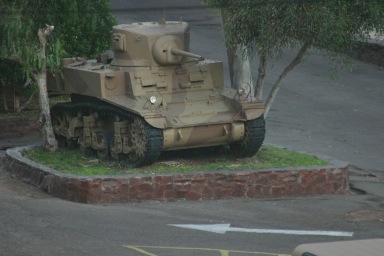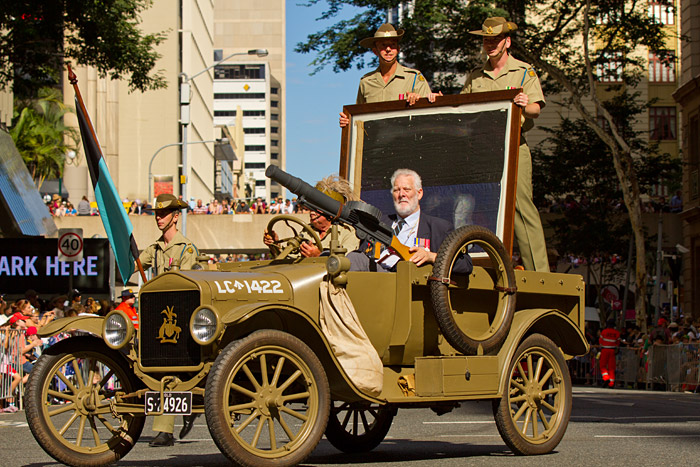
Antofagasta
30-May-2010 Filed in: Travels
30 May
The locals I’ve met through work have been fantastic - supportive of the lost gringo and his bad Spanish. Wandering around the city, shops, and hotel, everyone has been just as good.
The only exception so far has been the Chilean Army. My hotel is opposite the local army base - which got set up during the Pinochet era. Despite all the bad stuff that happened here during his time in power, there were some good things with the government’s focus to assist development of cities such as Antofagasta, and the country in general. They turned Antofagasta’s formerly rough rocky foreshore into a picturesque waterfront promenade. It now has beaches, some bars, good restaurants, a broad main highway which serves as the backbone connecting the city - and a significant number of modern apartment buildings springing up to take advantage of the ocean views. It’s given the city something to be truly proud of. But, unfortunately, another legacy of that era is the fact that the country’s military seem just a little paranoid. To the uninitiated, such as myself, it seems to verge on the point of being ridiculous. The military base located across the road from my hotel has a great collection of World War II era vehicles, and some older equipment, on display next to the main gates - in just the same way as many military installations around the world. There are tanks, cannons, and some old American M3 half-tracks. They’re fantastic old vehicles and interesting to anyone with a love of old things and a sense of history - but I was shocked at the reaction on my attempt to take a photo.
Despite being 65 years old, or older - but they’re apparently still a State secret based on the military’s reaction. The mere sight of my camera quickly resulted in soldiers running after me and using some quite forceful (albeit nominally polite) Spanish - requesting me to hand over my camera then scanning through the images to ensure I hadn’t taken any photos. Ironically, if they wanted to protect the details of their base then (1) putting a big international hotel across the road and looking down over the site wasn’t a great idea, and (2) their camp details and layout are already there for all to see on Google Earth ... and I’m sure anyone with seriously bad intent would just spring a few hundred bucks for the more up to date and detailed photos which you can readily purchase from Satellite mapping companies.
I recognise that sometimes there is a genuine need for National Security. Antofagasta was originally a Bolivian seaport, and strategic because of its port and its nitrate deposits which (at the time) were vital for explosives and weapon manufacture. Today, it’s still important because of the mineral wealth, with Copper, Lithium, and many other deposits in the Atacama desert outside the city. This area became Chilean in the War of the Pacific when Bolivia tried muscling in on the (mostly) Chilean workers and companies who were developing the resources - coming off much worse, and with the result that Bolivia ended up losing the territory and thus became completely landlocked. Whilst it’s true that many Bolivians would like the territory back, I’m sure they’ve accepted that times have changed. From the Chilean perspective, I would have hoped that the Chilean military based here wouldn’t have considered a lone gringo with a camera to be part of the Bolivian advance forces sneaking in to recapture the territory after 140 years! As little common sense goes a long way, and I would hope that the military would have realised that they have much to gain by treating people well, and sharing something of their history and culture with others. It builds friendships, pride, and a sense of professionalism. Despite the history of the Pinochet years, the military here still have a lot to be proud of - from their early years and their more recent activities building a modern professional army with peacekeeping efforts alongside the UN. A little good PR goes a long way - whereas heavy-handed tactics with tourists visiting the city, and who’ve just crossed the road from their hotel door, is something that seems pointless and silly.

Nonetheless, the day was saved for me by a simple Chilean fisherman at the local markets. His reaction to my camera was the complete opposite and, seeing the wandering gringo, he happily obliged my interest in the local sealife swimming around the waterfront - throwing fish offcuts into the water below and attracting the local sea lions. Not only did he give me a chance to see the animals up close, but he also put on an adhoc show feeding them for myself and a few bemused locals (see today’s photo gallery)

Andrew Mercer
I'm a Business Intelligence and Data Warehousing consultant based in Brisbane, Australia. I've consulted on or managed several large BI systems in New Zealand, Australia and Latin America.

Contact Info
Please use the contact form on this site.
Or phone 04 5704 1640 (Australia)
Or phone 04 5704 1640 (Australia)
Navigation
Photos
Latest Articles
blog comments powered by Disqus
